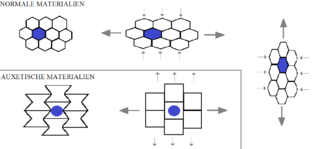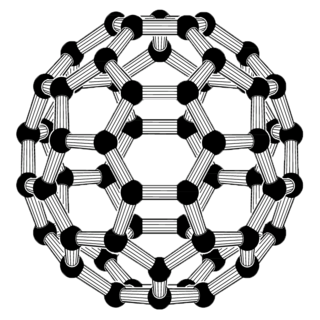
The Pratt School of Engineering is located at Duke University in the United States. The school's associated research, education, alumni and service-to-society efforts are collectively known as Duke Engineering.

Auxetics are structures or materials that have a negative Poisson's ratio. When stretched, they become thicker perpendicular to the applied force. This occurs due to their particular internal structure and the way this deforms when the sample is uniaxially loaded. Auxetics can be single molecules, crystals, or a particular structure of macroscopic matter.

Deborah Louise McGuinness is an American computer scientist and researcher at Rensselaer Polytechnic Institute (RPI). She is a professor of Computer, Cognitive and Web Sciences, Industrial and Systems Engineering, and an endowed chair in the Tetherless World Constellation, a multidisciplinary research institution within RPI that focuses on the study of theories, methods and applications of the World Wide Web. Her fields of expertise include interdisciplinary data integration, artificial intelligence, specifically in knowledge representation and reasoning, description logics, the semantic web, explanation, and trust.

Nanocomposite is a multiphase solid material where one of the phases has one, two or three dimensions of less than 100 nanometers (nm) or structures having nano-scale repeat distances between the different phases that make up the material.

Rodney S. "Rod" Ruoff is an American physical chemist and nanoscience researcher. He is one of the world experts on carbon materials including carbon nanostructures such as fullerenes, nanotubes, graphene, diamond, and has had pioneering discoveries on such materials and others. Ruoff received his B.S. in chemistry from the University of Texas at Austin (1981) and his Ph.D. in chemical physics at the University of Illinois-Urbana (1988). After a Fulbright Fellowship at the MPI fuer Stroemungsforschung in Goettingen, Germany (1989) and postdoctoral work at the IBM T. J. Watson Research Center (1990–91), Ruoff became a staff scientist in the Molecular Physics Laboratory at SRI International (1991–1996). He is currently UNIST Distinguished Professor at the Ulsan National Institute of Science and Technology (UNIST), and the director of the Center for Multidimensional Carbon Materials, an Institute for Basic Science Center located at UNIST.
Hüseyin Şehitoğlu is a Turkish mechanical engineer who holds the John, Alice, and Sarah Nyquist Endowed Chair at the Department of Mechanical Engineering at the University of Illinois at Urbana-Champaign, United States. Hüseyin Şehitoğlu received a B.S. in mechanical engineering from City University London, in 1979, and a M.S., and Ph.D. in theoretical and applied mechanics from the University of Illinois at Urbana-Champaign, in 1981 and 1983, respectively.

Marco Amabili is a professor who holds the Canada Research Chair in Vibrations and Fluid-Structure Interaction, Department of Mechanical Engineering at McGill University, Montreal, Québec, Canada.
The William Prager Medal is an award given annually by the Society of Engineering Science (SES) to an individual for "outstanding research contributions in either theoretical or experimental Solid Mechanics or both". This medal was established in 1983. The actual award is a medal with William Prager's likeness on one side and an honorarium of US$2000.

Alper Erturk is a mechanical engineer and the Woodruff Professor in the George W. Woodruff School of Mechanical Engineering at Georgia Institute of Technology.

Xin Zhang is a Distinguished Professor of Engineering at Boston University (BU).
Christopher Ward Macosko (1944) is an American chemical engineer and professor emeritus in the department of chemical engineering and materials science at the University of Minnesota. He is internationally known for his work in polymer science and engineering, especially in the areas of rheology and polymer processing. Macosko is an author of more than 500 academic papers, dozens of patents, and two books including the text: "Rheology: Principles, Measurements and Applications". He served as director of the Industrial Partnership for Research in Interfacial and Materials Engineering (IPRIME), a university-industry consortium at the University of Minnesota, from 1999 to 2018. Macosko and his wife Kathleen have been married since 1967 and are long-time residents of Minneapolis. They have four children and 12 grandchildren.
Alan Kin-tak Lau is an engineer and academic based in Hong Kong SAR. He is the President and Chair Professor of Product Innovation at Technological and Higher Education Institute (Thei) of Hong Kong. Prior to this appointment, he was Pro Vice-Chancellor at Swinburne University of Technology. He is also the Independent Non-Executive Director of King’s Flair International (Holdings) Limited, the International Vice President and Trustee Board member of The Institution of Mechanical Engineers (2014-2019) and an Academic Advisor at Asia University. He was also appointed the Chair of professional accreditation panel for APEC/IPEA for Korea. From 2014 to 2016, he was the Alex Wong/Gigi Wong Endowed Professor in Product Engineering Design at the Hong Kong Polytechnic University (HPKU). Currently, he is a Fellow of European Academy of Sciences and Arts, the European Academy of Sciences. Lau has conducted research in the field of Mechanical Engineering, Aerospace Engineering and Materials Engineering. His work has been focused on aerospace composites, Unmanned aerial vehicle, product design and engineering and bio-composites. Lau is recognized as Australian National Research Leader in Composite Materials 2019, published by The Australian Post. Within the period 2020-2022, he was Director of Oceania Cybersecurity Centre Limited and Stawell Underground Physics Laboratory Company.
Gurpreet Singh is a professor of Mechanical and Nuclear Engineering at [Kansas State University]. He is endowed by the Harold O. and Jane C. Massey Neff Professorship in Mechanical Engineering. Singh was born in Ludhiana, India; he currently resides in the United States.
Tequila Harris is an American mechanical engineer and professor. She is Professor of Manufacturing at the George W. Woodruff School of Mechanical Engineering. She works on polymer processing and mechanical system design.
Linda Sue Schadler is the Dean of the College of Engineering and Mathematical Sciences at the University of Vermont. Her research investigates the mechanical, optical and electric behaviour of polymer composites. She is a Fellow of the Materials Research Society and ASM International.
Natalia M. Litchinitser is an Electrical Engineer and Professor at Duke University. She works on optical metamaterials and their application in photonic devices. Litchinitser is a Fellow of the American Physical Society, The Optical Society and the Institute of Electrical and Electronics Engineers.
Ellen Marie Arruda is an American mechanical engineer known for her research on the mechanical properties of polymers and on tissue engineering, with applications including the design of improved football helmets, artificial tooth enamel that can withstand high-shock and high-vibration environments, and nanolayered composite materials that are lightweight, as strong as steel, and transparent. The Arruda–Boyce model for the behavior of rubber-like polymers is named for her and her doctoral advisor Mary Cunningham Boyce, with whom she published it in 1993. She is Maria Comninou Collegiate Professor of Mechanical Engineering and Tim Manganello / Borg Warner Department Chair of Mechanical Engineering at the University of Michigan.
Arthi Jayaraman is an Indian-American scientist who is the Centennial Term Professor for Excellence in Research and Education at the University of Delaware. Her research considers the development of computational models to better understand polymer nanocomposites and biomaterials. Jayaraman was elected Fellow of the American Physical Society in 2020.
Ashlie Martini is a tribologist and professor of mechanical engineering at University of California, Merced.
Jaime C. Grunlan is a material scientist and academic. He is a Professor of Mechanical Engineering, and Leland T. Jordan ’29 Chair Professor at Texas A&M University.







